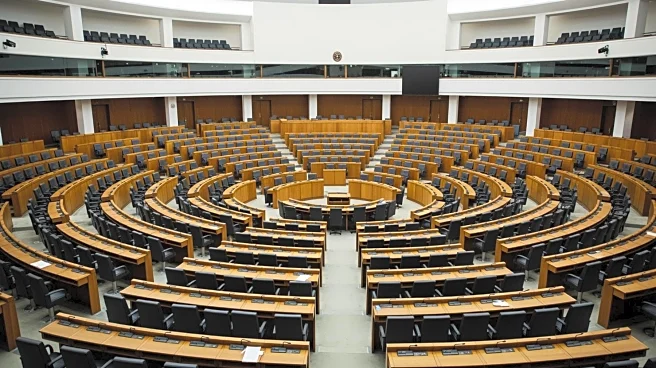What's Happening?
The European Parliament, a key institution of the European Union, is set to increase its number of Members of the European Parliament (MEPs) from 705 to 720 in the upcoming elections scheduled for June
2024. This change reflects demographic shifts since the last elections in 2019. The Parliament, which directly represents EU citizens, plays a crucial role in adopting EU legislation, overseeing the EU budget, and supervising other EU institutions. It operates alongside the Council of the EU and the European Commission, sharing legislative and budgetary powers. The Parliament's functions have expanded over time, with successive treaties enhancing its role in the EU's institutional framework.
Why It's Important?
The increase in MEPs signifies the European Parliament's growing influence in shaping EU policies and legislation. As the only directly elected body within the EU, the Parliament's expanded representation aims to better reflect the diverse interests of EU citizens. This change is expected to enhance the Parliament's ability to address complex issues such as human rights, international agreements, and EU enlargements. The expansion also underscores the EU's commitment to democratic representation and proportionality, ensuring that smaller member states have adequate representation despite their population size.
What's Next?
The upcoming elections in June 2024 will determine the composition of the European Parliament for the next five years. Political parties across member states are preparing for these elections, which will set the stage for future legislative priorities and the direction of the European project. The Parliament will continue to work closely with the Council and the Commission to address pressing issues such as climate change, economic recovery, and digital transformation. The increased number of MEPs may lead to more dynamic debates and diverse perspectives within the Parliament.
Beyond the Headlines
The expansion of the European Parliament's seats highlights the EU's ongoing efforts to adapt to demographic changes and ensure fair representation. This development may influence the balance of power within the Parliament, potentially affecting coalition dynamics and legislative outcomes. The increased representation could also lead to more robust discussions on EU policies, fostering greater collaboration among member states. Additionally, the Parliament's role in promoting human rights and democracy both within and outside the EU may be strengthened as it gains more influence in international affairs.









